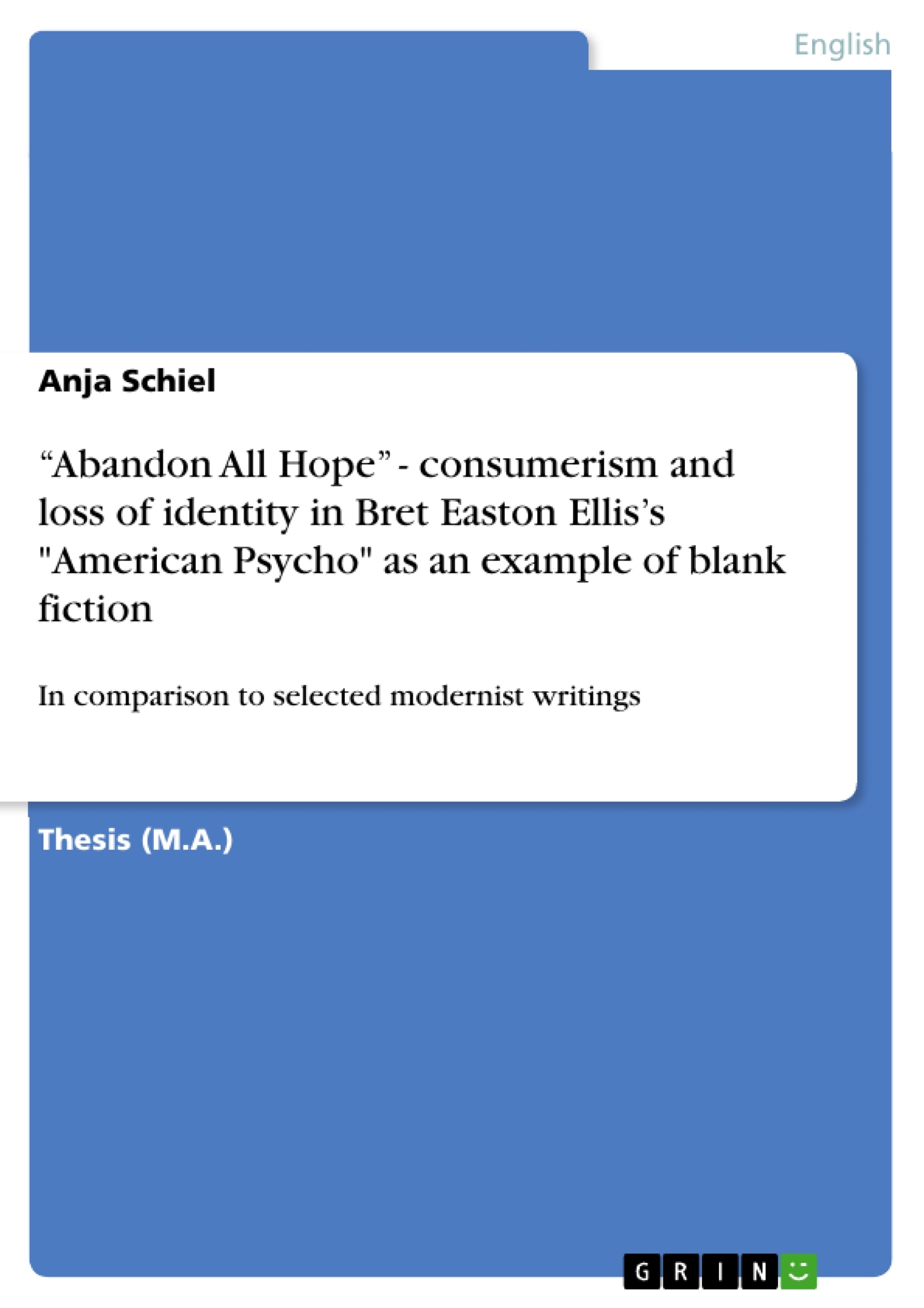
“Abandon All Hope” - consumerism and loss of identity in Bret Easton Ellis’s "American Psycho" as an example of blank fiction
Magisterarbeit, 2005
109 Seiten, Note: 1,5
Leseprobe
Table of Contents
- Introduction
- Blank Fiction
- A new direction of culture and literature
- Blank Fiction and Postmodernism: attempts to classify a new literary movement
- Fiction within a cultural context: Consumer Culture as a defining factor of Blank Fiction
- American Psycho as Blank Fiction
- A new direction of culture and literature
- Consumer Culture in Literature - A Recent Development?
- Consumerism and Loss of Identity
- Belongingness or: Trying to Fit In
- Labels
- Fashion
- Otherness
- Looks
- Narcissism
- Choice: Shopping and Accumulation
- Food and Restaurants
- Drugs and Drinks
- Producer or Product?
- Labels
- Reality
- Narrator Reliability
- Violence
- Voice
- Changes in Tense and Point of View
- Music
- Media
- Narrator Reliability
- "This is not an Exit"
- Circularity
- "Abandon all Hope"
- Values
- History. Or: Past, Present, Future
- Belongingness or: Trying to Fit In
- Conclusion
Objectives and Key Themes
This paper analyzes the portrayal of consumer culture in Bret Easton Ellis's novel American Psycho, comparing it to the treatment of consumerism in selected works by modernist writer F. Scott Fitzgerald. The main objective is to highlight the differences between both the effects and the treatment of consumerism in Blank Fiction and modernism. The paper explores the deep immersion in consumer culture of both author and protagonists of Blank Fiction, a stark contrast to the world of the rich in Fitzgerald's novels. It argues that Blank Fiction, through its style and content, mirrors the superficiality of consumer culture.
- The rise of Blank Fiction as a literary movement in contemporary American literature.
- The relationship between consumer culture and the loss of identity in Blank Fiction.
- The stylistic differences between Blank Fiction and modernist writing.
- The critique of consumer culture in American Psycho and its impact on the novel's characters.
- The cyclical nature of consumption and its consequences for the protagonists and the reader.
Chapter Summaries
The introduction explores the classification of American Psycho as a literary work and highlights the growing focus on consumer culture in contemporary American literature. It introduces the concept of Blank Fiction as a literary movement that reflects the emptiness and superficiality of consumer culture. Chapter 1 provides a detailed analysis of Blank Fiction, exploring its characteristics, its relationship to postmodernism, and its defining factor: consumer culture. This chapter also focuses on American Psycho as an example of Blank Fiction and its use of consumer goods as secondary characters.
Chapter 2 examines the evolution of consumer culture in literature, tracing its presence in American fiction from the works of F. Scott Fitzgerald to the emergence of Blank Fiction. Chapter 3 delves into the themes of consumerism and loss of identity, exploring the ways in which characters like Patrick Bateman seek belonging through consumption. It discusses how the pursuit of material possessions and the constant exposure to advertising contribute to a sense of emptiness and a lack of individual identity.
The chapter also examines the role of labels, fashion, food, and drugs in defining identity within the context of consumer culture. Finally, it explores the issue of narrator reliability and the ambiguity surrounding the violence depicted in the novel.
The final section, "This is not an Exit," examines the circularity of consumption and its impact on the characters and the reader. It explores the themes of "abandon all hope," the loss of values, and the absence of a clear past, present, or future within the context of consumer culture. This section highlights the cyclical nature of consumption, its role in creating a sense of entrapment, and its ultimate consequence: the loss of individual identity.
Keywords
Blank Fiction, consumer culture, loss of identity, American Psycho, Bret Easton Ellis, F. Scott Fitzgerald, The Great Gatsby, Tender is the Night, postmodernism, millennial angst, fiction of insurgency, new narrative, downtown writing, punk fiction, advertising, materialism, superficiality, emptiness, violence, narrator reliability, circularity, entrapment, "abandon all hope," postmodernism.
Details
- Titel
- “Abandon All Hope” - consumerism and loss of identity in Bret Easton Ellis’s "American Psycho" as an example of blank fiction
- Untertitel
- In comparison to selected modernist writings
- Hochschule
- Universität Hamburg (Sprach-, Literatur- und Medienwissenschaft)
- Note
- 1,5
- Autor
- Anja Schiel (Autor:in)
- Erscheinungsjahr
- 2005
- Seiten
- 109
- Katalognummer
- V90034
- ISBN (eBook)
- 9783638039666
- ISBN (Buch)
- 9783638936422
- Dateigröße
- 901 KB
- Sprache
- Englisch
- Schlagworte
- Hope” Bret Easton Ellis’s American Psycho
- Produktsicherheit
- GRIN Publishing GmbH
- Preis (Ebook)
- US$ 40,99
- Preis (Book)
- US$ 52,99
- Arbeit zitieren
- Anja Schiel (Autor:in), 2005, “Abandon All Hope” - consumerism and loss of identity in Bret Easton Ellis’s "American Psycho" as an example of blank fiction, München, Page::Imprint:: GRINVerlagOHG, https://www.diplomarbeiten24.de/document/90034
- Autor werden
- Ihre Optionen
- Vertriebskanäle
- Premium Services
- Autorenprofil
- Textarten und Formate
- Services für Verlage, Hochschulen, Unternehmen

- © GRIN Publishing GmbH.
- Alle Inhalte urheberrechtlich geschützt. Kopieren und verbreiten untersagt.
- info@grin.com
- AGB
- Open Publishing
Der GRIN Verlag hat sich seit 1998 auf die Veröffentlichung akademischer eBooks und Bücher spezialisiert. Der GRIN Verlag steht damit als erstes Unternehmen für User Generated Quality Content. Die Verlagsseiten GRIN.com, Hausarbeiten.de und Diplomarbeiten24 bieten für Hochschullehrer, Absolventen und Studenten die ideale Plattform, wissenschaftliche Texte wie Hausarbeiten, Referate, Bachelorarbeiten, Masterarbeiten, Diplomarbeiten, Dissertationen und wissenschaftliche Aufsätze einem breiten Publikum zu präsentieren.
Kostenfreie Veröffentlichung: Hausarbeit, Bachelorarbeit, Diplomarbeit, Dissertation, Masterarbeit, Interpretation oder Referat jetzt veröffentlichen!
- GRIN Verlag GmbH
-
- Nymphenburger Str. 86
- 80636
- Munich, Deutschland
- +49 89-550559-0
- +49 89-550559-10
- info@grin.com
-









